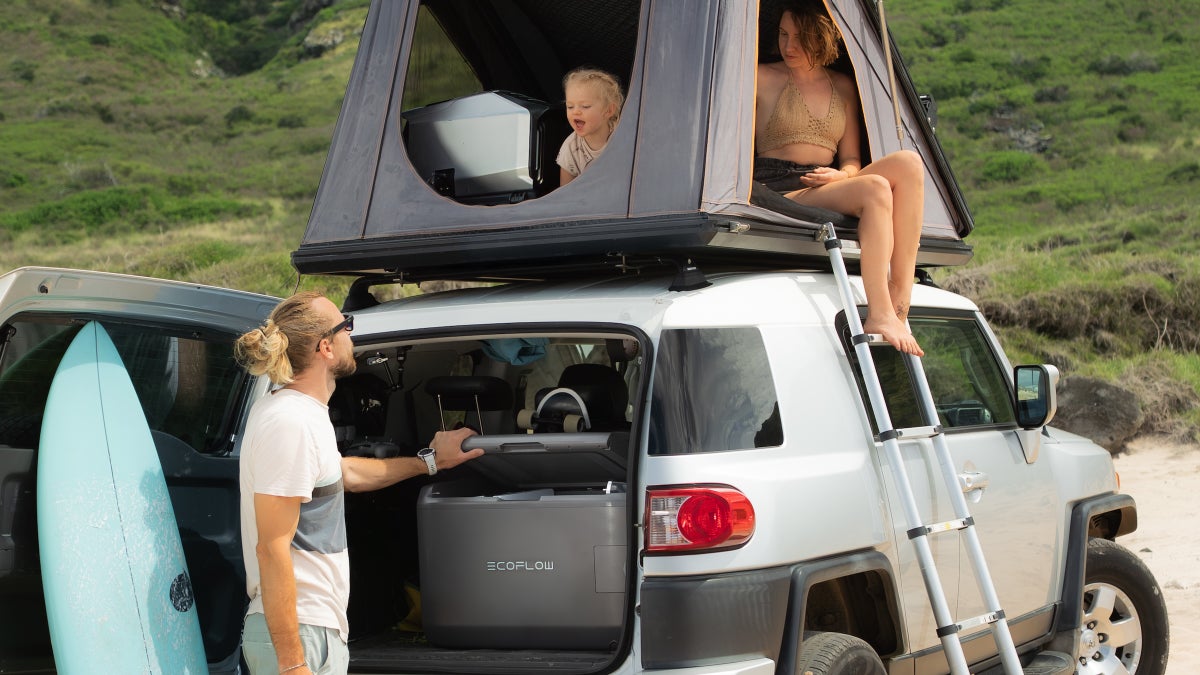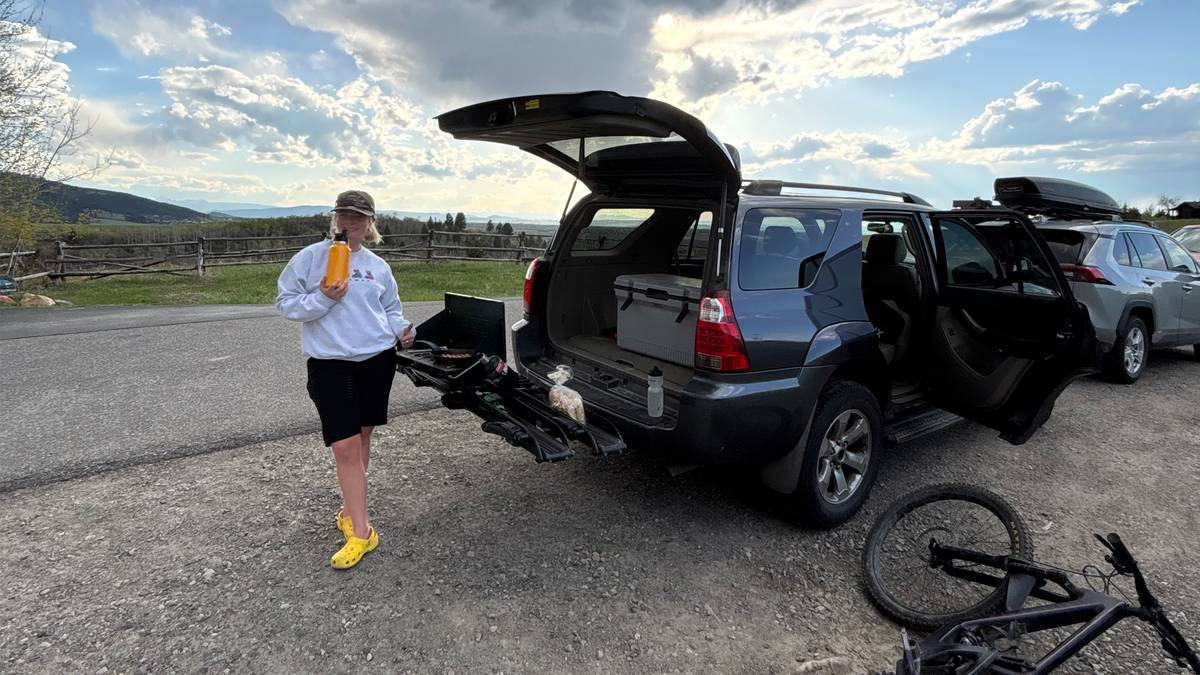
The right bike rack makes transporting your ride easy, secure, and stress-free. Whether you’re hauling an e-bike, mountain bike, road bike, or fat bike, a well-designed rack should be intuitive to use and built to last. We tested 22 racks across 8 vehicles with a range of bike types, prioritizing ease of use in real-world conditions, including cross-country road trips in both summer and winter. From hitch racks to tailgate pads, here are the best bike transport options for every type of rider.
At a Glance
- Best Overall: Kuat Piston Pro ($1,098)
- Best Off-Roading Rack: 1UP Super Duty ($600)
- Best Budget Hitch Rack: Hollywood Racks Trail Rider Hitch Bike Rack ($300)
- Best Trunk Bike Rack: Saris Bones 3 ($260)
- Best Tailgate Pad: RaceFace T3 ($259)
- Best Vertical Rack: Thule ReVert 6 ($1,100)
- Best Bike Rack for Fat Bikes: Saris Edge ($1,000)
- Best Swing-Away Rack Adapter: 1UP RackAttach ($589)
- How to Choose a Bike Rack
- How We Test
- Meet Our Testers
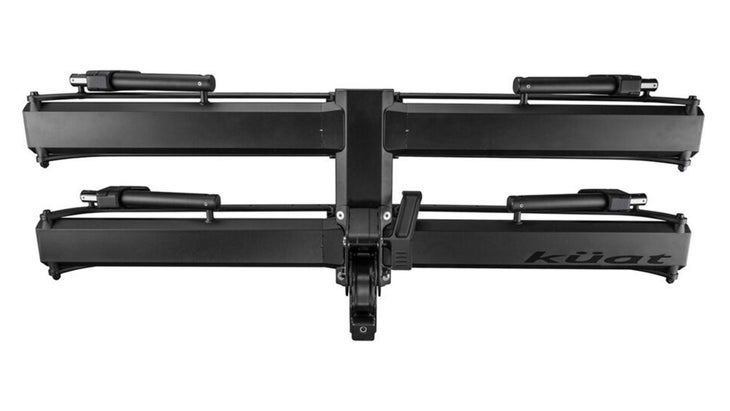
Best Overall
Kuat Piston Pro
$1,098 at Backcountry $1,098 at Kuat
Weight Limit: 67 lbs per tray
Capacity: 2 bikes with add-ons for up to 2 more
Wheel Diameter Range: 18-29 in.
Max Tire Width: 5 in.
Rack Weight: 63 lbs
Pros and Cons
⊕ No frame contact
⊕ Air-assisted arms
⊕ Durable
⊗ Expensive
⊗ Heavy
The Kuat Piston Pro sets a high standard for hitch racks. With its dual-arm, touchless design, loading and unloading bikes is as simple as pressing a lever. The button-operated pneumatic arms open wide, which makes loading and unloading bikes a breeze. The powder-coated aluminum construction ensures longevity, and the foot-operated tilt mechanism allows easy trunk access, even when loaded. You’ll also score extra nonchalant cool points at the trailhead when, at the press of a button, the rack’s arms open wide, making it much easier to operate the rack while also holding your bike. “I’ve never used a rack with arms that open on their own, and now it’s the only rack I want to use,” noted one tester.
Like many racks of this style, the Piston Pro secures bikes at both tires, therefore avoiding frame contact, which makes it ideal for lightweight carbon frames and high-end builds. It accommodates a variety of wheel and tire sizes, including larger 29-inch mountain bikes and narrow road tires.
While it lacks some of the luxury features of the Piston Pro X, like gold stanchions and integrated tail lights, the Piston Pro remains the easiest and most refined tray rack available. It was favored by all of our testers for its ease of use and the wide range of bikes it can transport securely.
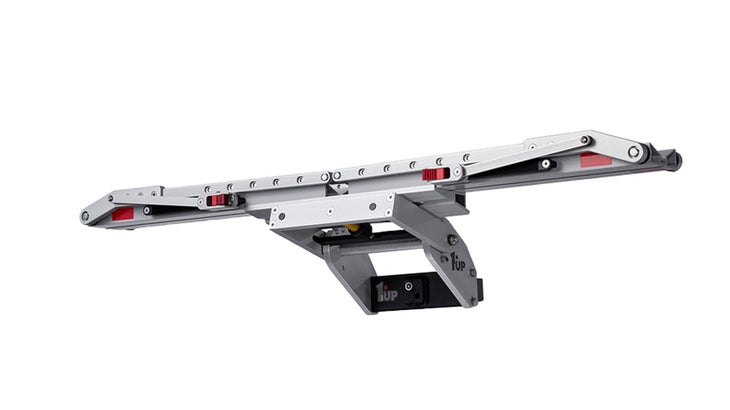
Best Off-Roading Rack
1UP Super Duty
Weight Limit: Up to 100 lbs per tray
Capacity: 2 bikes with add-ons for up to 2 more
Tire Diameter Range: 16 -29 in.
Max Tire Width: 5 in.
Rack Weight: 64 lbs
Pros and Cons
⊕ Durable
⊕ Handles heavy bikes
⊕ Extremely stable
⊗ Heavy
⊗ Tilt lever is very difficult to use
The 1UP Super Duty was designed for rugged terrain, heavy loads, and transporting bikes in the toughest conditions. Its all-metal construction is overbuilt in the best way, with robust, ratcheting arms that hold bikes by the tires without frame contact.
While it lacks some of the creature comforts of Kuat’s Piston Pro, such as the auto-opening arms, the Super Duty is one of the most secure and versatile racks available—perfect for heavy e-bikes and off-roaders needing a rack that won’t rattle loose. The strong clamping mechanism ensures that even on rough roads, your bikes stay in place without shifting. Unlike many hitch racks, it lacks plastic parts, which can become fragile in cold weather and are more susceptible to UV damage, which bodes well for long-term durability.
Several of our testers noted that the lever used to tilt the rack is very hard to access, especially when the rack is fully loaded. We strongly recommend adding 1Up’s EZ Pull handle ($99). In our opinion, this should be a standard feature. While it’s not the most user-friendly rack in our round-up, it was voted “The bike rack most likely to survive the apocalypse” by one tester.
Whether you’re heading deep into bumpy backcountry roads or need a reliable option for heavier e-bikes, the 1UP Super Duty is the best option.
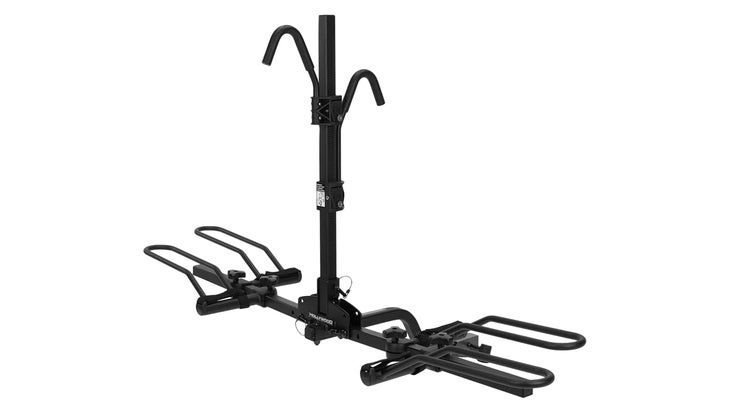
Best Budget Hitch Rack
Hollywood Racks Trail Rider Hitch Bike Rack
$300 at Amazon $300 at Hollywood Racks
Weight Limit: 45 lbs per tray
Capacity: 2 bikes
Wheel Diameter Range: 20 – 29 in.Max Tire Width: 3 in.
Rack Weight: 37 lbs
Pros and Cons
⊕ Affordable
⊕ Compact folding design
⊕ Easy install and adjustability
⊕ R Trunk access
⊗ Clamps to the bike’s frame
⊗ Less durable than premium options
⊗ Low weight limit
For those seeking an affordable yet functional hitch rack, the Hollywood Racks Trail Rider is hard to beat. While it lacks the features of higher-end models, its simplicity and effectiveness make it a solid choice for casual riders. The rack folds compactly when not in use and includes an easy-to-use yet basic tilt function for rear vehicle access.
This tray-style rack secures bikes via padded frame clamps and adjustable wheel trays. The ratcheting hooks contact bikes’ top tubes, which isn’t ideal for delicate carbon bikes, but for budget-conscious cyclists who need a reliable way to transport their bikes, this rack is a worthwhile option. Installation is straightforward, and it holds two bikes securely, making it an excellent choice for weekend riders or those new to hitch racks.
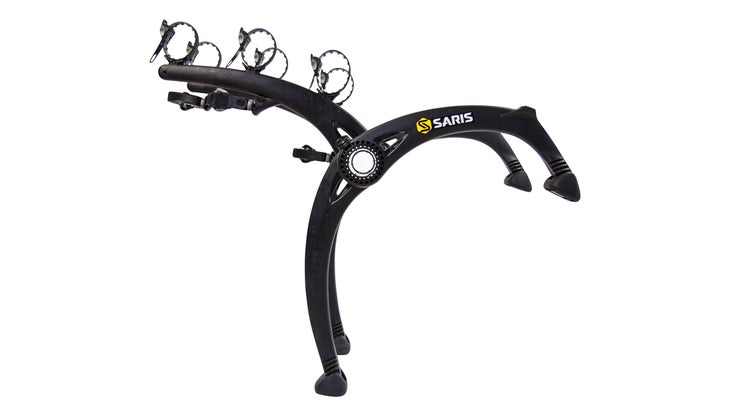
Best Trunk Bike Rack
Saris Bones EX 3-Bike
Weight Limit: 35 lbs per cradle
Capacity: 3 bikes
Rack Weight: 11 lbs
Pros and Cons
⊕ Lightweight yet strong
⊕ Fits wide range of vehicles
⊕ Secure ratcheting straps
⊕ Folds for easy storage
⊗ Longer setup time
⊗ Obstructs rear visibility on many vehicles
⊗ Less stable
Launched back in 1996 with minimal revisions since then, the Saris Bones EX 3 remains one of the most user-friendly trunk racks on the market. Its injection-molded arms and legs are lightweight yet strong, and the arc design helps fit a wide range of vehicles, including hatchbacks and many SUVs. The ratcheting straps make securing bikes quick, though the bikes are more prone to contact each other than with tray-style hitch racks. Thanks to its low weight, installation is easy. It also folds down for storage when not in use, making it perfect for cyclists who are short on space.
While trunk racks inherently require more setup time than hitch racks, the Bones EX 3 is the easiest to use in its category.
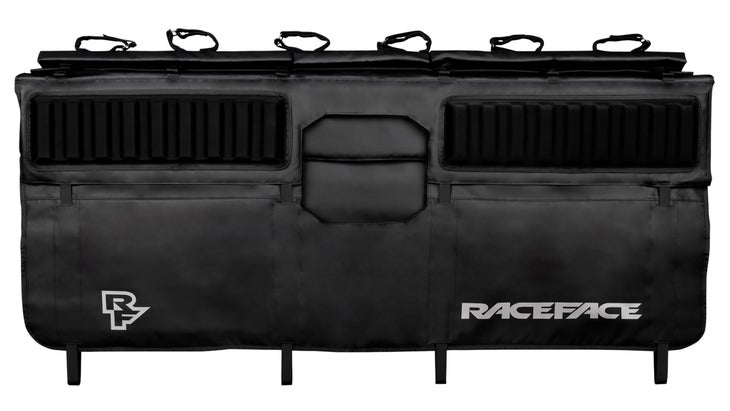
Best Tailgate Pad
Race Face T3
Capacity: 6 bikes
Rack Weight: 5 lbs
Pros and Cons
⊕ Allows tonneau covers to fully close
⊕ Secure
⊕ Versions available for compact and full-size trucks
⊕ Removable downtube attachments
⊗ Not as theft-resistant as hitch-mounted racks
⊗ Only compatible with trucks
If you have a large group of riding buddies that you need to transport via pickup truck, a tailgate pad is essential. Though less secure than traditional racks, tailgate pads are affordable, and some of the latest models—including the Race Face T3 do an excellent job of preventing bikes from knocking against each other during transport.
A rigid, compression-molded foam pad protects fork crowns and keeps the front of up to six bikes secure, preventing unnecessary movement. While testing, we found the Race Face T3 did the best job of keeping bikes separated thanks in part to the ribbed fork pad that prevents bikes from swaying side to side.
Unlike many other tailgate pads, the T3’s thick foldaway downtube padding swings out of the way, allowing your tonneau cover to fully close and lock when bikes are removed—no more gaps when securing other cargo.
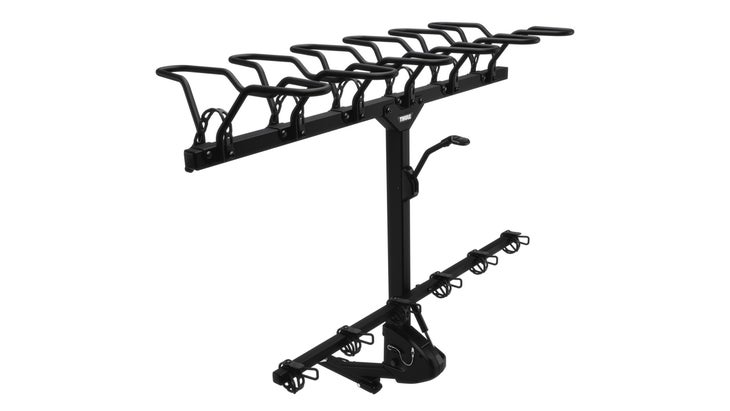
Best Vertical Rack
Thule ReVert
$1,100 at REI $1,100 at Backcountry
Weight Limit: 55 lbs per cradle
Capacity: 6 bikes
Wheel Diameter Range: 29-in. wheels (20 – 24-in. accessory available separately)
Max Tire Width: 3 in. (4 – 5-in. wheel basket available separately)
Rack Weight: 88 lbs
Pros and Cons
⊕ Holds up to six bikes
⊕ Easy lifting and lowering
⊕ Rear vehicle access
⊕ Protective of frames
⊗ Large and heavy
⊗ Expensive
Vertical racks have gained popularity as high school mountain bike leagues have sprouted up across North America because hauling a minivan full of kids to mountain bike practice requires a heavy-duty bike rack. Designed for riders needing to transport multiple bikes, the Thule ReVert 6 holds six bikes vertically by their front wheels.
The rack’s assisted tilting feature allows for easier loading and rear vehicle access—a rare feature in vertical racks. What also sets the ReVert 6 apart from other vertical-style racks is its hydraulic damper, which provides weight assistance—much like the lift supports on the hatch of a minivan or SUV—making it easier to both lower and raise the rack when fully loaded. This feature is incredibly useful because lifting a rack loaded with six bikes can be challenging.
Although the price and rack weight are both quite hefty, the ReVert 6 is an ideal solution for teams, families, and riders who need a high-capacity, user-friendly rack. Plus, the wheel baskets accommodate a wide range of tire sizes, and the padded cradles help prevent frame damage.
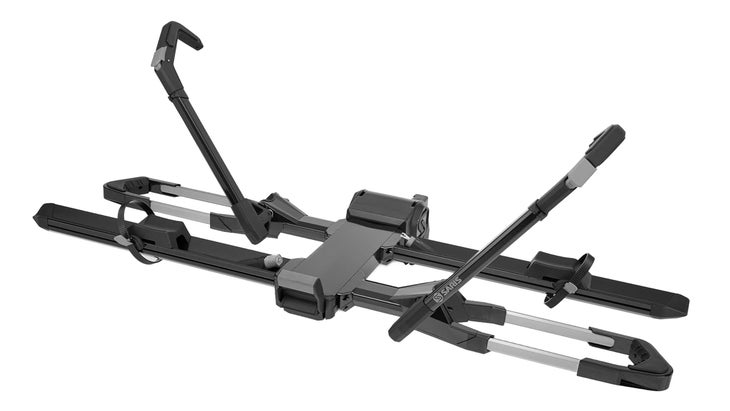
Best Rack For Fat Bikes
Saris Edge
$1,000 at Amazon $1,000 at Saris
Weight Limit: 80 lbs per tray
Capacity: 2 bikes
Wheel Diameter Range: 24 – 29 in.
Max Tire Width: 5 in.
Rack Weight: 65 lbs
Pros and Cons
⊕ Can fit tires up to 5 inches wide
⊕ Easy installation
⊕ Integrated locking system
⊗ Heavy
⊗ Handles a limited range of wheel sizes
⊗ Expensive
Fat bikes demand a rack that can handle their oversized tires with stability, and the Saris Edge does just that. While many racks claim to support tires up to 5 inches wide, few do so as securely as this one. Plus, its fixed-position, spring-loaded arm avoids contact with bikes’ frames and forks. The included rear-wheel riser block also lifts bikes by 2.5 inches, preventing seat and handlebar interference between bikes.
The “hollow spoon” tray design does a great job of transporting skinny-tired road and gravel bikes as it does fat bikes, and its high weight capacity allows it to carry e-bikes weighing up to 80 pounds each. The tool-free anti-wobble system ensures a secure fit, while integrated locking cables keep bikes safe.
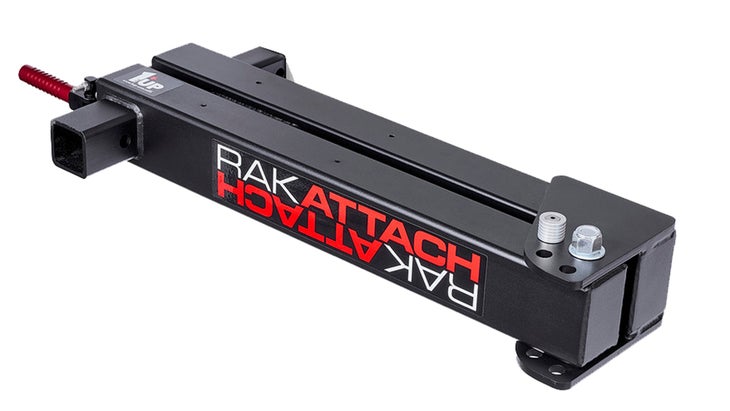
Best Swing-Away Rack Adapter
1UP RakAttach
Weight Limit: 275 lbs
Weight: 56 lbs
Pros and Cons
⊕ Sturdy
⊕ Accommodates both right- and left-sided operation
⊗ Expensive
For those who need easy access to their vehicle’s rear compartment while using a hitch rack, the 1UP RakAttach is the best swing-away adapter available. (Vanlifer’s, this one’s for you.) The 2.0 version retains the same hinge and clasp mechanisms as the original, but it now features the ability to flip and open toward the vehicle’s driver or passenger side, adding versatility for different setups.
The RakAttach pivots 100 degrees and has a 275-pound weight capacity, making it suitable for carrying hitch bike racks or cargo carriers. Of all the swing-away adapters we tested, the RakAttach had the least amount of sway while testing on rough fire roads. Whether you’re loading gear or accessing your trunk, truck bed, or the rear of your Sprinter van, the RakAttach extends your hitch rack away from the vehicle with ease.
How To Choose a Bike Rack
When choosing a bike rack, consider your vehicle type, bike weight, and the number of bikes you need to carry. For instance, if you’re carrying one or more e-bikes, you’ll need to ensure your rack and hitch accommodate higher weight requirements. Also, consider how frequently you plan to carry bikes. If you plan to use it multiple times a week, investing in a top-quality hitch rack will pay off. If you only plan to use a rack several times a year, a more budget-friendly option, like a trunk rack, might be a better choice.
Hitch Racks vs Trunk Racks vs Tailgate Pads
Hitch racks are the most secure and convenient but require a receiver hitch. (We strongly recommend using a Class III 20-inch receiver whenever possible, as it has a higher weight limit and provides significantly more stability than 1 ¼-inch models.) Trunk racks offer affordability and the versatility to mount them on vehicles without trailer hitches, but they require more setup and generally don’t carry bikes as securely as platform-style hitch racks. Tailgate pads work best for truck owners transporting multiple mountain bikes.
How We Test
We tested these racks on eight different types of vehicles, including trucks, hatchbacks, SUVs, and vans. Our goal was to evaluate them based on ease of use, security, and durability. We assessed each rack in our test in real-world conditions that included quick after-work rides as well as multi-state road trips to our favorite riding destinations in Colorado, Utah, Washington, Oregon, and Arkansas. While we logged more than a thousand highway miles, we also spent time on unpaved forest roads to gauge which racks would really limit sway (and hold up to abuse).
We also tested the weather resistance of each rack by leaving them on vehicles during winter driving conditions. We took note of the time it took to assemble each rack, as well as installation and load times. During testing, we noted any issues with bike stability, usability, and degradation in performance due to wear and tear.
Meet Our Testers
Josh Patterson has been riding and wrenching on bikes for 20 years and, with a master’s degree in journalism, has been writing about the sport for more than half of that time. He’s a cycling generalist who finds joy in riding road, gravel, and mountain bikes.
Samantha Boon has turned wrenches in bike shops, worked in trail advocacy, and written for several cycling media titles. She’s an avid rider and professional communicator who is able to convey the features and benefits of the products she tests in an approachable manner.
Robbie Jackson doesn’t just ride bikes; he also builds them. In addition to being a fabricator, Jackson enjoys off-roading and overlanding, making him the perfect candidate to stress-test bike racks on the back of his Ford Raptor.
The post These Are the Best Bike Racks on the Market appeared first on Outside Online.












